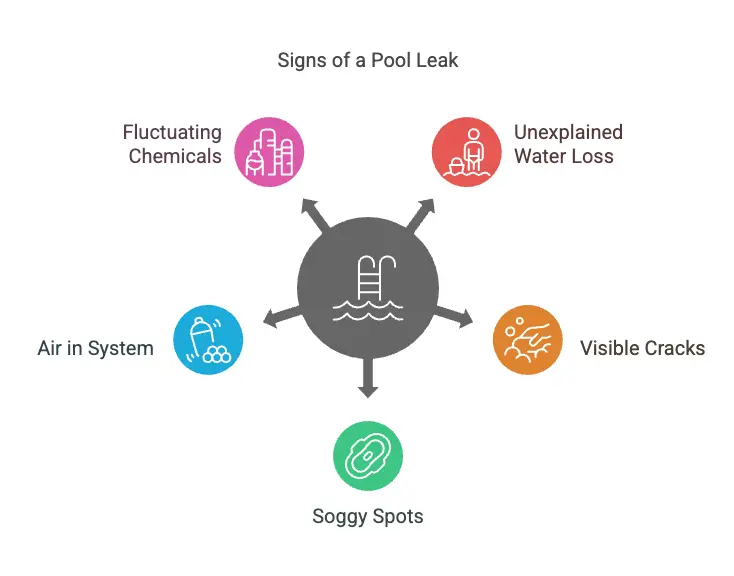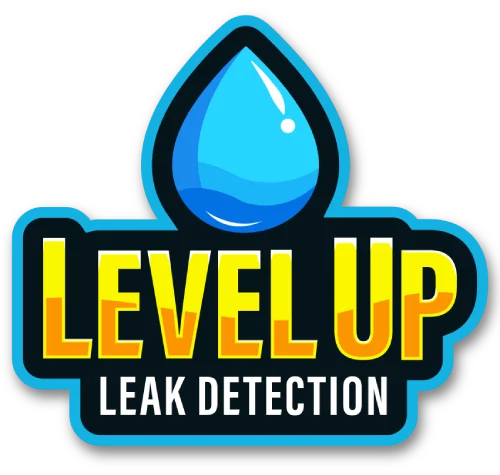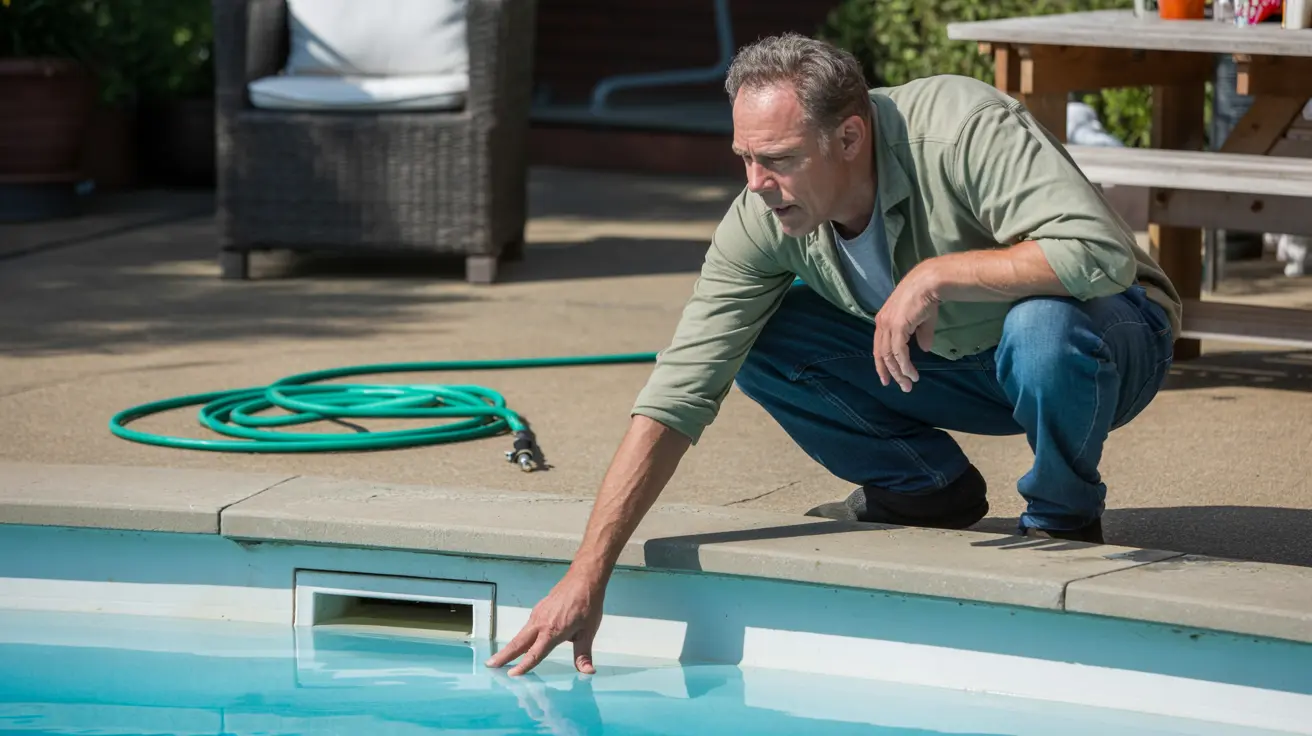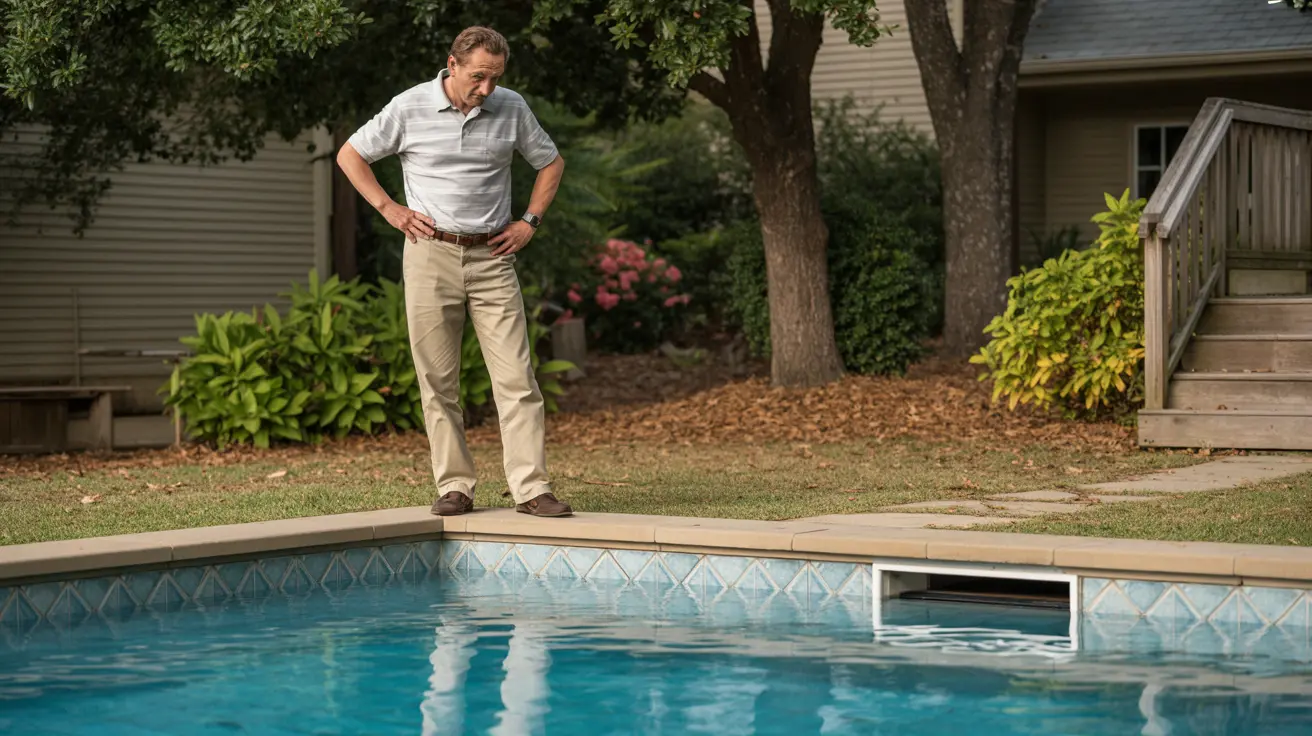June 2, 2025
Top 5 Signs Your Pool Has a Hidden Leak – and What to Do Next
Swimming pool leak detection and repair guide. Find a leak somewhere? Stop water loss! Get tips on swimming pool leaks!

Is your pool losing water faster than usual? Are you noticing cracks or soggy spots in your yard? Hidden leaks can turn your backyard oasis into a costly headache. In this guide, we’ll help you spot the top signs of a pool leak, explain simple tests you can do at home, and show you how Level Up’s pool leak detection services can save you time, money, and stress. Don’t let a small leak become a big problem-read on to protect your pool and your wallet.
What Are the Most Common Signs of a Pool Leak?
Here are the top 5 signs your pool may have a hidden leak:
- Unexplained Water Loss: If you’re refilling your pool more often than normal, it’s a major red flag.
- Cracks or Gaps: Visible cracks in the pool shell, tile line, or around fittings could mean water is escaping.
- Soggy Spots or Erosion: Wet patches or sinking areas around the pool, spa, or fountain often indicate underground leaks.
- Air or Dirt in the System: If you notice air bubbles or dirt coming from your pool returns, a leak in the pipes or fittings may be the culprit.
- Fluctuating Chemical Levels: Constantly adjusting your pool chemicals or battling algae can be a sign that water (and chemicals) are leaking out.
Visual clues are key. Look for puddles or damp spots near the pool or spa, even if it hasn’t rained. These may indicate a leak somewhere in your pool’s plumbing or structure. If you spot any of these warning signs, don’t ignore them-leaks can cause costly damage if left unchecked.

How Can I Tell If My Pool Is Leaking or Just Evaporating?
It’s normal for pools to lose some water to evaporation, especially in hot climates. But excessive water loss usually points to a leak. The bucket test is a simple way to tell the difference. Fill a bucket with pool water, place it on a pool step, and mark the water levels inside and outside the bucket. After 24-48 hours, if the pool water level drops more than the bucket’s, you likely have a leak.
Wind, humidity, and temperature all affect evaporation rates. Compare your pool’s water loss to neighbors’ pools or use an online evaporation calculator for your area. If your pool is losing more water than expected, it’s time to look for leaks.
What Causes Pool Leaks in Residential Pools?
Pool leaks can happen for many reasons. Over time, ground movement, freeze-thaw cycles, or simple wear and tear can cause cracks in the pool shell, tile line, or deck. Vinyl liners can develop tears or punctures, especially near seams or fittings. Underground pipes may shift or break, and equipment like pumps and filters can develop leaks at joints or seals.
Leaks can also start near skimmers, drains, or lights, where fittings and seals are under constant pressure. Even small cracks or gaps can allow water to escape, leading to bigger problems if not repaired quickly.
Where Do Most Pool Leaks Happen?
The most common places for pool leaks are:
- The pool shell (cracks in gunite, fiberglass, or vinyl liner)
- Around the skimmer or return fittings
- Underground pipes and plumbing
- Pool equipment pad (pump, filter, heater)
- Water features like spas or fountains
Leaks near the skimmer or tile line are especially common. If you see water loss near the skimmer, or air bubbles in the pump, a leak may be occurring in these areas. Wet spots or mushy ground around the pool often point to underground plumbing leaks.
How Do I Perform a Bucket Test for Pool Leak Detection?
The bucket test is a simple, reliable way to check for leaks:
- Fill a 5-gallon bucket with pool water and place it on a pool step.
- Mark the water level inside the bucket and the pool water level outside the bucket.
- Turn off the pool’s filter system and leave the bucket for 24-48 hours.
- Compare the water loss inside the bucket to the pool. If the pool loses more water than the bucket, you likely have a leak.
This test helps you rule out evaporation as the cause of water loss. If you confirm a leak, it’s time for further inspection or professional help.
What DIY Methods Can I Use to Detect Leaks?
Besides the bucket test, you can try a dye test. With the pool still, squirt a small amount of pool dye or food coloring near suspected leak areas-like cracks, fittings, or around the skimmer. If there’s a leak, the dye will be pulled toward the source. For vinyl liner pools, feel for soft or squishy spots, which may indicate a leak under the liner.
You can also visually inspect the pool shell, tile line, and deck for cracks, loose tiles, or wet spots. Check around all pipes, fittings, and equipment for moisture. If you find any of these signs, it’s time to call in the experts.
When Should I Call a Professional for Pool Leak Detection?
DIY tests can help, but some leaks are hard to find without specialized tools. If you’ve confirmed a leak but can’t locate it, or if the leak is in underground pipes or equipment, it’s best to call a professional. Level Up’s highly-trained leak detection specialists use advanced technology-like listening devices, pressure testing, and hydrophones-to pinpoint the exact location of the leak quickly and accurately.
Professional pool leak detection services save you time, prevent further damage, and ensure repairs are done right the first time. Plus, our repairs come with a warranty and satisfaction guarantee.
How Does Level Up Find and Repair Pool Leaks?
At Level Up, we specialize in efficient, innovative pool leak detection and repair. Our technicians use state-of-the-art tools like hydrophones and listening devices to find leaks-even those hidden underground or underwater. We inspect every part of your pool, spa, and fountain, including the vinyl liner, pipes, and equipment.
Once we locate the source of the leak, we offer repair solutions tailored to your pool’s needs. Many repairs can be done underwater with advanced adhesives and patches, so you don’t have to drain your pool. Our years of experience and commitment to quality mean you get fast, reliable service-every time.
What Are the Risks of Ignoring a Swimming Pool Leak?
Ignoring a pool leak can lead to costly damage. Water escaping from your pool can erode soil, damage the pool’s structure, and cause cracks or sinking in the deck. Leaks can also waste thousands of gallons of water, drive up your water bills, and disrupt your pool’s chemical balance, leading to algae and bacteria growth.
Left unchecked, a small leak can turn into a major repair job. Early detection and repair save you money and extend the life of your pool.

How Can I Prevent Future Pool Leaks?
Regular pool care and inspection are your best defense. Check your pool’s water level, shell, and equipment often. Keep an eye out for cracks, loose tiles, or wet spots. Schedule routine inspections with a professional, especially if your pool is older or has had leaks before.
Level Up offers maintenance plans and leak detection services to help you catch problems early. With our innovative methods and guarantee, you can enjoy your pool worry-free.
Key Takeaways
- Sudden water loss, cracks, wet spots, and high water bills are top signs of a pool leak.
- Use the bucket test to tell the difference between evaporation and a leak.
- Leaks can happen in the shell, liner, pipes, fittings, or equipment.
- DIY tests can help, but professional pool leak detection is best for tricky leaks.
- Level Up uses advanced technology and years of experience to pinpoint and repair leaks efficiently.
- Ignoring leaks can cause costly damage and water waste.
- Regular inspections and maintenance help prevent future leaks.
- Level Up guarantees fast, reliable, and warrantied pool leak repairs-so you can get back to enjoying your pool.
If you suspect your pool is leaking, don’t wait-contact Level Up today for expert swimming pool leak detection and repair services. We’re here to help you keep your pool, spa, and fountain in top shape, all season long!





